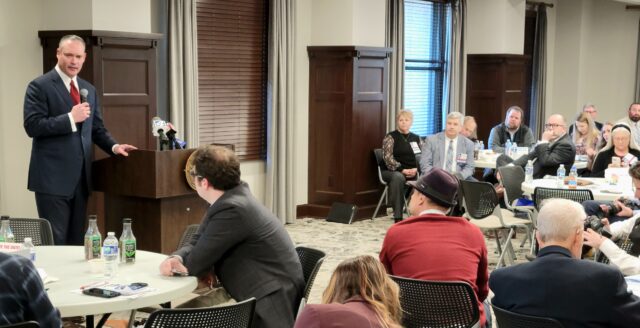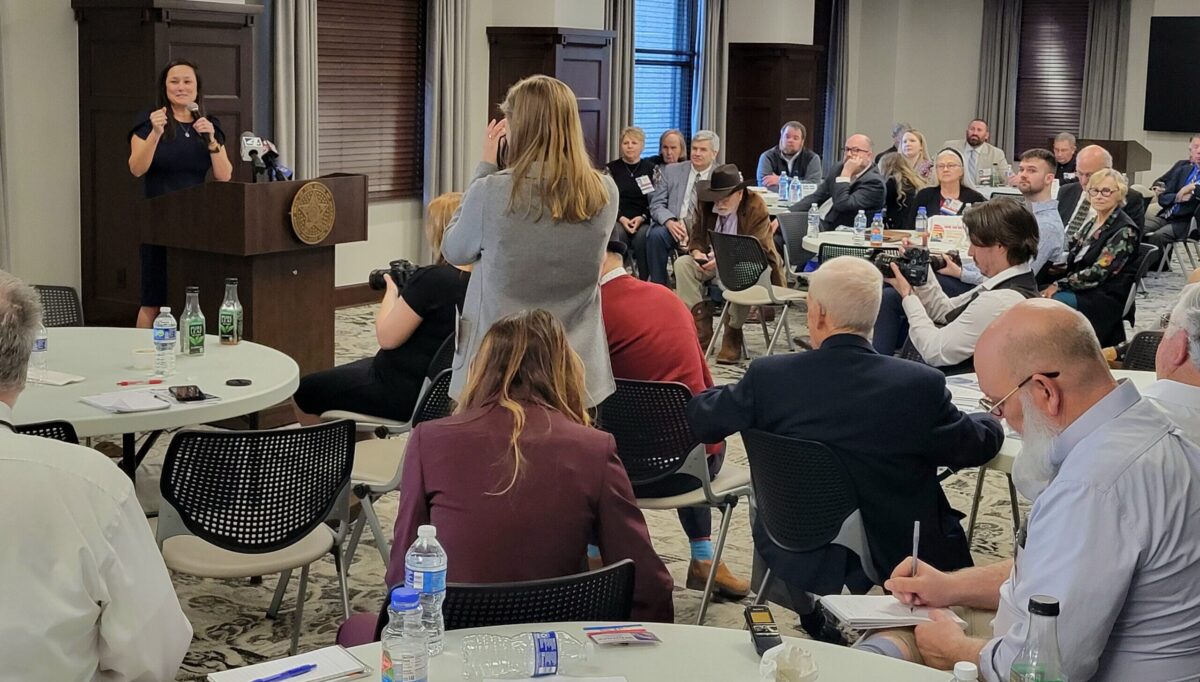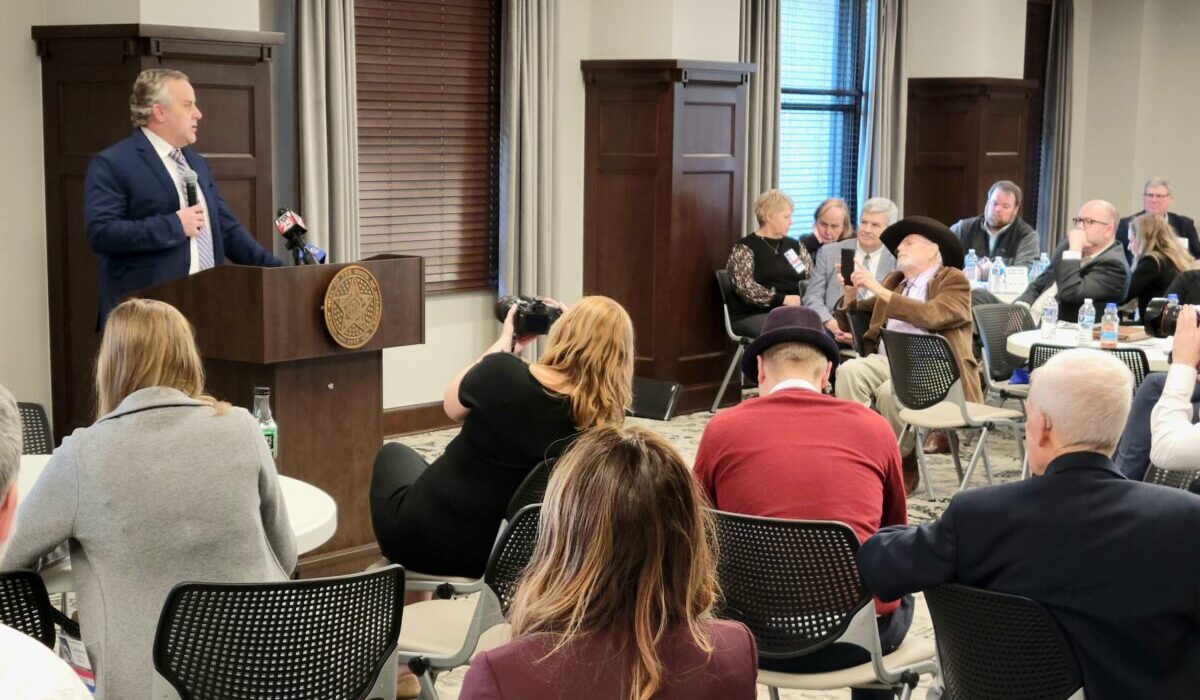
As legislators wound up the first week of this year’s regular four-month session, the leaders of both chambers pitched their ideas Thursday to cut state taxes, disagreeing over which would be most beneficial to Oklahomans.
House Speaker Charles McCall (R-Atoka) told members of the Oklahoma Press Association during its legislative summit at the State Capitol that Oklahoma is in its best financial shape ever and can absorb a 0.25 percent personal income tax reduction. He also expressed frustration that the State Senate hasn’t voted on the matter.
“I will be exiting the state of Oklahoma and leaving in its best state that it’s ever been,” said McCall, who is serving his last year because of legislative term limits. “The state has the highest level of reserves that we’ve ever had.”
State reserves total more than $4 billion, he said. About half of that is unappropriated money that the state could use in the future if Oklahoma would experience another economic downturn as it did nine years ago.
“I also believe the tax cut is necessary because it really is the only mechanism that we have in the state of Oklahoma to help our citizens combat inflation,” McCall said. “We can’t print money. We don’t set monetary policies at the state level.”
But Senate President Pro Tempore Greg Treat (R-OKC) said a cut in the state’s portion of the grocery sales tax would have an immediate effect and would save average Oklahomans at least five times more money than a 0.25 percent income tax cut.
He filed SB 1283, which would eliminate the state’s portion of the grocery tax. According to recent data average Oklahomans spend nearly $300 per trip to the grocery store, putting the state in the top 10 in the nation for highest grocery bill per week, Treat said.
Depending on individual household spending, a cut in the state portion of the grocery sales tax would save Oklahomans about $700 per year, while a 0.25 percent income tax cut would save most Oklahomans about $110 at the end of every year after they file their taxes.
Treat said eliminating the state share of the grocery sales tax is his personal position.
“That’s not a position the Oklahoma State Senate Republican Caucus takes or the position of the Oklahoma Senate” he said. “I’m a person who can influence that process to a great degree, but I don’t have 25 (votes) yet. I’m approaching 25 on that, the votes I would need to pass it. I’m trying to win hearts and minds on that issue because I think it impacts people to a much greater degree than the income tax would, especially middle-wage earners and those people who are hurt most by the inflationary period.”
McCall said he doesn’t oppose cutting the state grocery sales tax and that it could be a mechanism to offer taxpayers relief.
But he said it’s time to act on the 0.25 percent income tax cut. House Republicans last week advanced a measure during the special session called by Gov. Kevin Stitt included the governor’s request of a 0.25 percent personal income tax rate reduction.
“The House believes this is long overdue,” McCall said. “We’ve had great numbers for the last four years.”
McCall said he has asked members of Senate leadership to put the income tax issue up for a vote.
“If they want to vote it down, they’re going to vote it down. If they want to pass it, pass it,” he said. “But at this point, we’ve had so many special sessions on this issue, we should dispose of it one way or the other.”
Treat said it’s best to wait until final figures are available on how much legislators will have to appropriate this session in a budget for the 2025 fiscal year, which begins July 1. That number should be available next week when the Oklahoma Board of Equalization is scheduled to meet Thursday, Feb. 15, and release its final estimate.
Democrats say cutting income tax harmful to state budget

Cutting the state personal income tax rate by 0.25 percent would reduce state revenues by about $240 million a year. During its December meeting, the Oklahoma Board of Equalization used Oklahoma Tax Commission estimates to project that lawmakers would have about $8.7 billion to appropriate from the state’s general fund. Anticipated new recurring revenue was projected at $280 million, but Treat and Senate Appropriations and Budget Chairman Roger Thompson (R-Okemah) have said they believe the final projection certified next week could be about $100 million less.
“That number is going to change after the 15th. If you do any tax cut in there at all, that all goes aways. That’s also going to be a discussion,” Thompson said Wednesday after a Senate budget committee meeting. “We’re talking about all these programs we want to do, but then if you go over here and you do a tax cut, make a choice. You can’t do this and this.”
At the OPA luncheon, McCall said part of the state’s cash reserves were generated by legislators appropriating only 90 percent of the money that was certified for spending, he said. Under the Oklahoma Constitution, legislators can appropriate up to 95 percent of the amount certified by the equalization board.
Treat reminded about 75 editors and reporters in the room that, a year ago, the equalization board’s final estimate was about $611 million less than its original estimate.
“We’re anxiously awaiting those numbers. It will help us chart the course for this session, and we’ll have great dialogue next week after we see those numbers,” Treat said.
House Minority Leader Cyndi Munson (D-OKC) said House Democrats oppose a cut in the personal income tax.
“We believe that that is harmful to the state budget and not helpful to everyday, working Oklahomans,” she said. “A tax cut at that level will really help the wealthiest Oklahomans, not your average person who’s in that $40,000 to $50,000 range.”
However, House Democrats support eliminating the state portion of the grocery sales tax, she said. The impact on the state budget for eliminating the state portion of the grocery sales tax is about $280 million, or close to the $250 million that a 0.25 percent personal income tax cut would cost, Munson said.
“Our argument is that cutting the sales tax on groceries helps people immediately and helps all Oklahomans, whereas the income tax really helps those at the highest level of income earners,” Munson said.
McCall said a cut in the personal income tax would reduce revenues, but he said a tax cut would generate additional revenue for the state because residents will spend the money in other ways.
“They don’t hold it. They spend it,” he said.
To illustrate his point, McCall said that after a 0.25 percent in the personal income tax and a 2 percent cut in the corporate income tax two years, state revenue is $500 million higher today.
“I believe that’s the economic impact of tax cuts,” he said.
Too early to discuss pay raises for state employees

Asked about possible pay raises for state employees, McCall said the House will wait until it sees the Senate’s proposed budget. Treat announced a new budget process plan, which he said will feature weekly budget discussions held publicly on Wednesdays and a full budget proposal passed as a resolution from the Senate to the House by the middle of the legislative session.
On Wednesday, the Senate appropriations and budget committee heard a presentation from the Director of the Oklahoma Health Care Authority, who told lawmakers that Medicaid expansion costs and last year’s increase in nursing home provider payments mean that a total appropriation of $1.3 billion is needed just to maintain the current level of Medicaid services. Underscoring the complicated task facing legislators, OHCA’s budget last year included a chunk of one-time funding, and the nursing home funding increase was viewed as a priority to avoid more facilities closing.
“I’m interested in seeing what actually comes out of the Senate,” McCall said.
Thompson has proposed a 9 percent across-the-board increase for state employees in SB 1292, although he acknowledged Wednesday that the proposal’s future is uncertain.
“I’m going to try my best to get it out of the policy committee with title on because it’s good policy. When it gets to the Appropriations Committee, I will add an amendment to it, and it’s going to be based on the availability of funds,” Thompson said. “So we will run it through the process, and then we’ll come back for a [General Conference Committee on Appropriations] for the end of our session (and see) what kind of money will be there. I want 9 percent. There may be 4 percent. There may be 8 percent. There may be 3 percent. I don’t know.”
State employees have lost about 18 percent of their buying power since their last pay raise in 2019, and McCall said Thursday he believes it’s time to improve their compensation.
“I think you have to look at raising state employees, their pay,” said McCall, a banker. “It goes along with the tax cut. Everybody’s experiencing inflation. Every business across the state, including my own, we’re raising wages and pay to our employees.”
Treat said he doesn’t know if the state can afford a 9 percent increase this year for state employees, and tax cuts would reduce the revenue available for such a proposal.
“There are targeted increases we can make but that will all come out through the budgeting process,” he said. “State employees are the backbone of serving Oklahomans and so I have deep respect for state employees.
“We’ve got to make sure just like on teachers’ salaries that we stay competitive. What that right number is, where those targets are, we’ll ferret it out through the legislative process this year.”




















